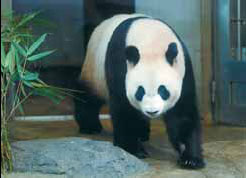Governor's panda comments criticized
|
Xiannu, the female giant panda who is called Shin Shin in Japan, pictured at Ueno Zoo in Tokyo on Thursday. Issei Kato / Reuters |
Chinese Foreign Ministry on Friday urged the Tokyo governor to cease any activities that harm bilateral ties and the image of Tokyo Prefecture.
Governor Shintaro Ishihara on Thursday suggested that if a Chinese panda was born in Japan, it should be named after the Japanese term for the Diaoyu Islands.
Whatever Ishihara wants to name the Chinese pandas and islands, China's ownership of them is unchanged, according to Hong Lei, the ministry's spokesman.
According to Kyodo News Agency, Shin Shin - a 6-year-old panda at Tokyo's Ueno Zoo who is known as Xiannu in China - appears to be pregnant. Shin Shin and Ri Ri, a male panda known as Bili in China, have been leased from China since February 2011, and were able to be viewed by the public shortly after the March 11 massive disasters, bringing some much-needed joy to the region.
Ishihara said that he was not interested in the panda's pregnancy, but proposed to name the cub after the so-called Senkaku, the Japanese name of the Diaoyu Islands.
"If a cub is born, it should be named Sen Sen or Kaku Kaku," Ishihara was quoted by media reports as saying.
"We will (eventually) return a panda cub (to China), right?" Ishihara said. "Our counterpart would at least be able to exercise sovereignty over a panda with the name of the islands."
Pandas are envoys of friendship, Hong told a daily news conference, adding that Ishihara's "cheap" and "shameful" farce, which was deliberately created to impair China-Japan relations, will only blemish the image of Tokyo as well as that of Japan.
If the panda's gestation signs are correct, this will be the first cub born in Japan's oldest zoo since 1988. "I'm sure Ueno Zoo, and all of Japan, are looking forward to that moment," Japan Daily Press quoted Yutaka Fukuda, Ueno Zoo's deputy director, as saying.
Japan's panda enthusiasts have been arriving in large numbers to get their last view of the panda before she is taken away from the public on July 3, and veterinarians believe she could give birth anytime next month, said the Nagoya-based media.
But this year, a series of remarks and activities by some Japanese politicians has added to the tension between Japan and its Asian neighbors.
In April, Ishihara said his city prefecture was negotiating with the "owner" of the islands in the hope of "buying them by the end of this year".
On Friday, Seoul announced it is holding off on signing a controversial military pact with Japan, following a strong backlash from political circles and the public, the Seoul-based Yonhap News Agency reported.
The announcement came less than an hour before the two nations were scheduled to sign the first bilateral defense pact since 1945, in Tokyo.
Seoul officials highlighted a growing need to share military intelligence on the Democratic People's Republic of Korea and China, but the military pact has been controversial because many people in the Republic of Korea still resent Japan for its brutal rule over the Korean Peninsula from 1910 to 1945, Yonhap said.
Hong reiterated that dialogue and negotiation are the only way to solve Korean Peninsula issues, urging related parties to be restrained about its complicated and sensitive situation.
China and Japan on Friday concluded a maritime defense consultation in Beijing.
Ishihara's comments are not the mainstream Japanese society's attitude to China, said Shen Shishun, an expert on Asia-Pacific studies with Haikou College of Economics.
"But Japan's aggression is like a scar to Asian countries, and its dishonesty to this history and occasional provocation will harm its Asian neighbors' trust," he said.
Contact the writer at zhaoshengnan@chinadaily.com.cn



















